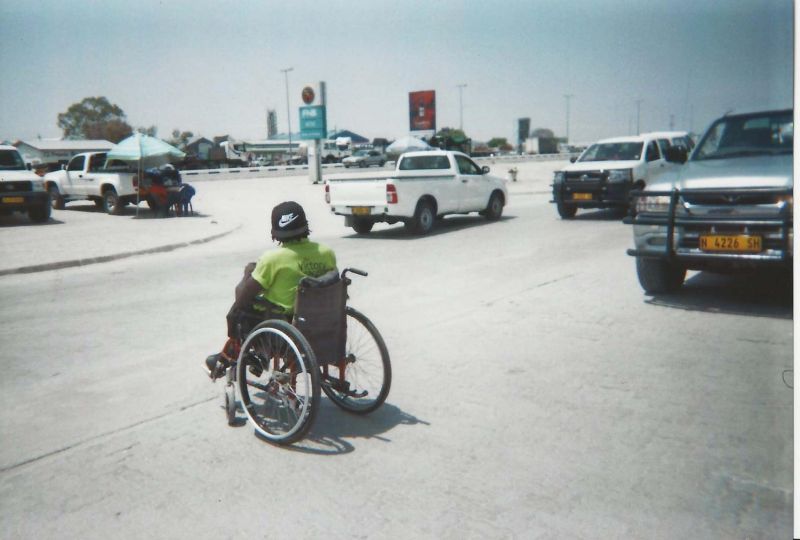Handicaps
Including everyone

The study was commissioned by Germany’s Federal Ministry for Economic Cooperation and Development (BMZ) and the GIZ-project “Inclusion of persons with disabilities”. It provides the theoretical framework for tackling the issue of inclusion, while its manual offers practical advice for all interested parties.
The research team that prepared the study used the opportunity to draft a manual with recommendations based on practical experience. The proposals resulted from numerous interviews with activists from disabled people’s organisations, GIZ staff, policymakers, instructors from vocational schools and responsible stakeholders from the transportation sector. The research team tested some of the proposals in workshops in Namibia and modified them accordingly. The practical examples in the publication are all based on first-hand experience.
One reason Namibia was considered a good location to conduct the research is the effort of the Namibian government to promote inclusion. This topic is an explicit component of various policy measures. In 2015, the government established a ministry devoted to addressing the needs of people with disabilities. Awareness-raising campaigns are educating local people about the marginalisation that people with disabilities experience. Nevertheless, there is an enormous gap between theory and practice. By the way, Namibia is the largest per capita recipient of official development assistance from Germany.
In Namibia, the researchers assessed barriers and needs. They paid particular attention to vocational education and transportation. On this basis, they made recommendations to GIZ Namibia, including:
- to provide sensitivity training and raise awareness among vocational school instructors and other actors, including company directors, human-resource managers and other decision-makers in the private sector,
- to identify core areas where GIZ consultants can promote inclusion as a cross-cutting issue,
- to involve Namibian disabled people’s organisations in drafting measures and promote these groups as GIZ partners, for instance by collaborating with disability trainers from civil-society organisations,
- to build and expand links between vocational schools and the labour market in order to facilitate the transition from school to work for job candidates with disabilities and
- to provide financial and technical support to partner organisations for the development of accessible instructional materials for trainees with disabilities.
The research team also considered GIZ’s transport programme in Namibia. Mobility is a central concern for people with disabilities.
Facilities that people take for granted in an advanced countries like Germany, like barrier-free infrastructure and accessible public transportation at least in larger cities, are only beginning to bud in developing countries. In Namibia, getting to school, work, training centres and public buildings is very difficult for people with impaired vision or mobility, for example if they depend on wheelchairs.
GIZ can help make Namibia’s public infrastructure more accessible, particularly in regard to lifts, barrier-free buildings and suitable pavements. Moreover, the acquisition of kneeling buses, which lower the floor at bus stops so it becomes easier to board them, is now close at hand in Namibia. It is always cheaper to ensure accessibility features when a new facility is built than to retrofit existing buildings with ramps and lifts.
The study also recommends:
- awareness-raising and education in order to stop discriminatory behaviour on the part of bus and taxi drivers towards people with disabilities,
- awareness-raising and information for GIZ decision-makers and partners in transportation on the topic of inclusion and building standards (national standards should incorporate requirements for accessible infrastructure),
- making the principles of accessible construction a mandatory part of the engineering curriculum (for future civil engineers/city planners) and
- the systematic inclusion of this topic into the bachelor and master’s civil engineering programmes at the University of Namibia.
Some of these recommendations have been implemented in the meantime. GIZ will hire someone to address crosscutting issues, and that person will also be in charge of disability issues. Kneeling buses will be acquired as soon as possible, and sensitivity training for drivers will take place. Inclusive measures, moreover, are being enacted in vocational education. Instructors are receiving training on how to deal with people with disabilities, and schools are becoming properly equipped to meet the needs of disabled students.
Inclusion matters in terms of economic development and poverty reduction, both of which are central to GIZ’s efforts in Namibia. The new manual provides a great deal of information on strategies and methods geared to make GIZ’s programmes inclusive.
The manual includes a tool to systematically test exactly how inclusive an organisation is. If it is not inclusive at all, the authors show what tangible steps serve to improve matters fast. The recommendations touch on issues ranging from the design of work places to organisational and institutional barriers. A core message is that costs of excluding people with disabilities and ignoring them exceed those of inclusion. Disability mainstreaming is not simply about charity and moral conviction, it is primarily about fully tapping the considerable potential of people with disabilities.
It makes sense to build facilities without barriers, since retrofitting is more expensive. In a similar sense, it is important to consider disabilities early on in developmental programmes and projects. Small things often have the greatest impact, and people with disabilities tend to be the best experts on what should be prioritised. Involving them and their representatives in the planning stages of a programme is the most effective way to ensure that their needs and expertise are taken into account.
The manual’s title is “Inclusion grows”. Inclusion is indeed seen as a process, because goals are not achievable over night. Good planning and joint efforts of a range of committed actors are what it takes to ensure that rights of people with disabilities are respected over the long term.
The manual does not raise demands, but makes recommendations. It is itself a living project. The authors expect the book to be expanded and modified depending on users’ feedback. GIZ will distribute the manual in selected partner countries so it can be edited based on users’ “reality check”.
Bettina Kieck has worked as a consultant on the inclusion of people with disabilities for 10 years. In 2015, she led the SLE team from Humboldt University Berlin mentioned in her essay.
bekieck@outlook.de
Links
Kieck, B., Ayeh, D., Beitzer, P., Gerdes, N., Günther, P., Wiemers, B., 2015: Inclusion grows. Toolkit on disability mainstreaming for the German Development Cooperation.
http://edoc.hu-berlin.de/series/sle/265-2/PDF/265-2.pdf
Kieck, B., Ayeh, D., Beitzer, P., Gerdes, N., Günther, P., Wiemers, B., 2016: Developing a manual on disability mainstreaming for the German Development Cooperation – case study Namibia.
http://edoc.hu-berlin.de/series/sle/265/PDF/265.pdf








